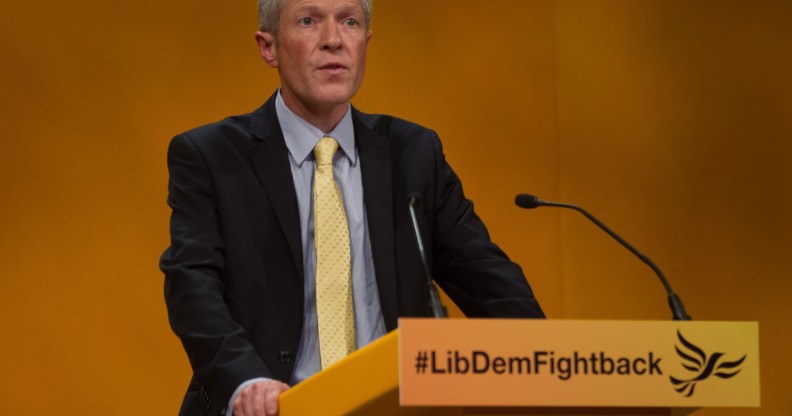Willie Rennie: We need a mindset change within mental health

PinkNews Exclusive
Willie Rennie, leader of the Scottish Liberal Democrats, spoke to PinkNews about Scotland’s mental health services and how to improve them, as well as his thoughts on UK Lib Dem leader Tim Farron.
Having taken over the party in May 2011 following a disastrous election, is hoping to fight off a Green advance.

You’re looking to raise income tax across all bounds by a penny, you’ve said that raises about £475,000,000 more for education.
It’s been updated to about £505,000,000 according to the latest HMRC post budget assessment.
Are you not worried that could negatively impact people who are the worst off?
No, because of a combination of the tax threshold increased together with the penny increase in tax, it has the effect of a tax cut for those on low incomes. You’d have to earn over £21,500 before you pay anymore money. So it’s progressive and it’s fair. Because the situation’s urgent, we need to ask people to pay a little bit more to invest.It used to be an investment in education, because Scotland’s education system used to be one of the best in the world and now it’s just average, the situation’s urgent and that’s why we need the investment.
So, are you in favour of pushing inclusive education and incorporating that into part of the education system in Scottish schools?
There’s a big effort to make sure we deal with all types of bullying in schools and to give the teachers and everybody who works in schools the skills, the talent, the knowledge the understanding in order to confront it.
Homophobic bullying has been a particular problem in schools. We still have got a latent problem with people just being uncomfortable talking about it, so we have to give people the confidence so that they feel comfortable to be able to deal with the root problem.
So yes a fully inclusive education is what we need.
A long standing Lib Dem policy is about looking at drugs more as a health issue rather than a criminal issue and obviously decriminalising drug possession. Would that also apply to the drugs that are used within the LGBT community for things like chemsex?
I would want to have an enlightened approach to all drugs irrespective of where they’re used, because we need to look to the long term and focus on rehabilitation where there’s a effective element to it.
Sending people to prison costs a fortune and actually doesn’t help the individual to ween themselves off the use of drugs. So it’s making sure that they’ve got a rehabilitative element to it at core, rather than a punitive element. Which to be honest doesn’t help.
The Portuguese system is the model that we’re looking to try and emulate and they’ve had quite a lot of success in recent years with that policy, so that’s what we’re trying to do so, it’s going to apply to all drugs in that context, irrespective of where they’re used.
There was a case recently in London where a young man actually died at a party from taking these substances and within the LGBT community it seems to be something that’s growing; particularly amongst gay men who will say they don’t see themselves as having a problem or an addiction by doing this. So how do we tackle the problem of chemsex without making it seem like an attack on the LGBT community?
That’s why I think we should be blind to where it’s used and focus on the issue and any addiction that it’s caused. I’m trying to deal with it on a drug issue rather than who uses it, because otherwise you get into targeting different communities in an unhelpful way and then you get stigmatisation which is what we’re all trying to avoid.
A big point is for Lib Dems especially is seeing mental health dealt with the same as physical health. Within the LGBT community people sometimes suffer from mental health problems more in comparison to wider society. I’m just wondering how you think we can make mental health services more accessible for vulnerable LGBT people?
I think the issue here is that people have felt stigmatised about accessing mental health services, from wherever they are. And in some communities it will be even more extreme; that stigmatisation.
I think therefore we need a mindset change within the mental health services to make sure that everybody feels able to access them without being dismissed and ridiculed, which has happened on occasions in some of the incidences I have come across. So I’m keen for the whole approach, the mind set that we adopt on mental health to change and a dramatic improvement on mental health services.
There are three different levels to this approach; one is in police and accident and emergency, so in extreme circumstances you want to access the mental health professionals. You want it on a community level so that, if you roll up to your GP surgery you can get access to a mental health professional pretty quickly. Then the final area is child and adolescent mental health services which are very poor in Scotland. So in all of those areas, we need to be able to be accessible to people, so that they don’t feel as if they’re being stigmatised.
I think it’s as applicable with the gay community as it is with other people who may feel they have the same kind of stigma and that’s why we’re trying to change mental health services as a whole. So I think our reforms will benefit people from the gay community immensely, because of the way that we’re trying to approach it. It’s that kind of mindset that will help everybody.
At the moment a lot of trans people still have to go to a GP and get diagnosed as being trans. Are you in favour of abolishing the mental health element that is required in this initially, to be diagnosed as trans? I know that a few of the other parties have said they are.
The excessively rigorous process you have to go through needs to be eradicated.
So that people are not subject to the pressure that could dramatically affect their mental health. The trauma we put people through contributes to their ill health in so many different ways and this is one of the easy ways to change it. There’s much more trust put in the individual about their choice, rather than having to prove to the rest of society who you are. People know who they are.
They should be free to make that choice.
That actually leads on to my next point; the Sandyford clinic in Glasgow. I know that does great work with people who identify as trans. But it is the only clinic we have in all of Scotland. It’s in Glasgow and if you’re in the Central Belt that’s great, but what about people for instance in the Highlands or up in Orkney who don’t have the same access to that? Do you think we need more clinics like Sandyford around the country to support trans people who don’t live in the Central Belt?
There is a huge demand for the service and the time that people have to wait is excessive, so we need to take firm action to improve the capacity of the service and there is loads of room to make sure we have a specialist service available to people.
We need a mixture between providing for the community in the more general sense and providing a more centralised specialist service. I think there will be a logic to doing something in the Northern part of the country to make sure that people won’t have to travel enormous distances.
Because going through the trauma of going to this facility is a big step to make that decision and then have to travel for miles to get there would then add to that pressure. So we need to rethink the capacity and make it more locally available, considering the specialist nature of it which by its very nature has to be a wee bit more in the centre, in order to make sure it’s an excellent service. Which the one in Glasgow is.
There’s been a lot of talk about how Scotland is becoming such a great place to be openly LGBT. But if we look at the Equality Network’s recent figures, that’s showed that the majority of people who identify as LGBT have suffered some sort of homophobic or transphobic abuse. I’m wondering how we can work with the police or how we can work with services to reduce hate crimes and make things better?
Well the first thing to do is not be complacent about it and we shouldn’t think in Scotland that we are somehow greatly superior in this area. There is no doubt we’ve made strides, but the battles ahead are still significant, because many people still have a resistance to this change and the first, most important thing, is to recognise that.
The second thing is just to provide the skills, the knowledge, the intelligence for people to be able to provide a service in a more quality focussed manner. That to me is how you change your root and branch and I don’t think it requires an awful lot of training; it’s just a little bit of extra support for people who to be honest just don’t know what to do. And that’s where I think the effort should be.
Do you think there’s more we can do in terms of Police Scotland?
I think that’s part of the service too. There’s no doubt they’re coming in contact with people across communities, so they’ve got a leading role to play as well in doing that. But it’s those kind of softer skills that we require. The police have been living up to quite radical changes; domestic violence for instance, so they’re very capable and well trained individuals. They should be able to acclimatise to other changes too. So they’re part of this change in service.
This might be the first generation we’ve got of police officers where no one who now who serves, served when it was illegal to be gay. I’m wondering if you think it’s worth while we have LGBT training within all new officer training? Or if it should be specialist officers who deal with it?
This is about, everybody in the public service. Being tuned, having antennae to be able to address these issues appropriately and sensitively. So this is not a specialist thing, this is a broader issue.
We require everybody just to be in the right place. It’s not something that has to overwhelm the training, I think it will come naturally to so many police officers, but it’s just making sure they’ve got the confidence to be able to deal with it.
In regards to the Lib Dem supporters who are in Scotland, do you think that the UK leader, Tim Farron has satisfied concerns over the ‘gay sex is a sin’ comments that were made last year?
Tim is a man of principle and intensity and he tells me that he is a supporter of gay rights and the gay community and I believe him. He’s obviously a man of faith as well and he thinks deeply about all of those issues.
But he’s a man who’s got fairness and equality running to his political core, so I trust him when he says that he is a supporter on that front and I think the evidence pretty well shows that.
Lastly, do you support the bill he’s currently trying to get through about the gay men’s blood ban, the one he’s trying to get changes on that currently?
Yeah, absolutely, that’s an example. He’s a decent guy, he thinks deeply about things, he doesn’t just say them to satisfy people. He genuinely believes in equality and fairness.

PinkNews’ election coverage is sponsored by the Royal Bank of Scotland.
Scottish Parliament elections take place on May 5.

